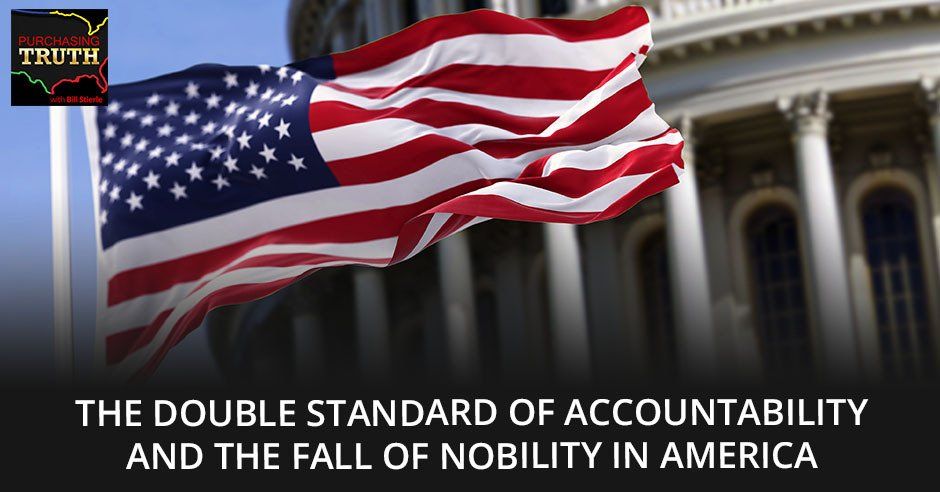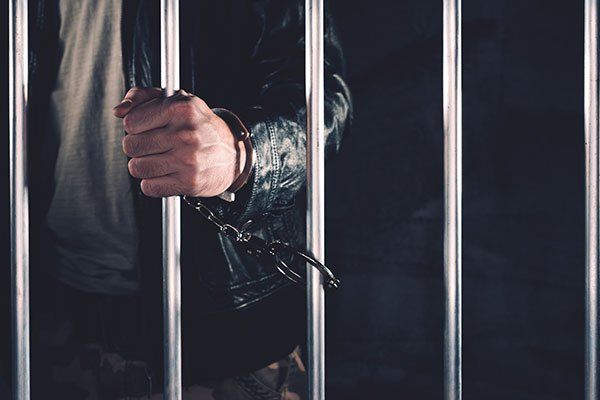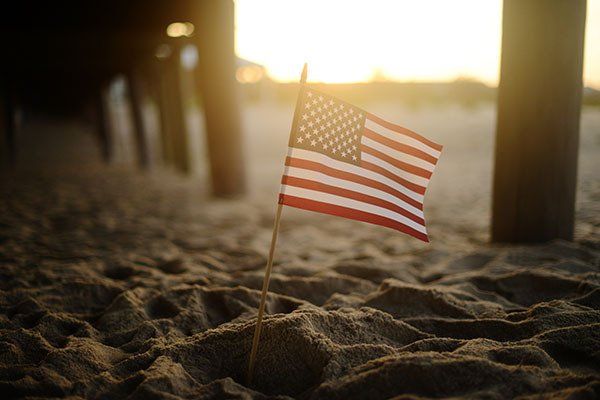The Double Standard of Accountability and the Fall of Nobility in America
Subscribe Today!

One of the biggest challenges faced by our country today is accountability. Be it from celebrities or politicians, there is a range of issues that need to be discussed and dealt with. Bill Stierle and Tom sit down to discuss what it is that creates such conflict and dissonance in the morals and values that we uphold as a nation. Why does a double standard exist? Why are laws enforced for others and excused for some? Listen in for a thought-provoking discussion on nobility and restoration of values in America.
---
Watch the episode here
The Double Standard of Accountability and the Fall of Nobility in America
Bill, there are a lot of things happening in our world both in the US and abroad that are bringing some interesting perspective to how we think, especially in America, about our elected representatives as well as our royalty in America, mostly the Hollywood stars. There are some interesting things to look at and talk about in terms of not only communication but also situational ethics, biases and things like that, which would be useful to talk about. What do you think?
Tom, the biggest challenge that bubbles up in front of us is accountability. How does accountability look or show up? That's important. How do we communicate accountability through the various things that people say and do and with that accountability take that step in the direction that allows us to pick a higher form of integrity and the ability to say something but still be passionate about it and not flame to the place of anger? How do we step into a place of taking the high road with certain situations and stuff and go from there?
The high road is certainly something. It seems to be all too often, the road less traveled. The other aspect is that in America, we seem to hold our TV personalities, actors and actresses more accountable for their actions than we do our elected officials. It seems the elected officials get an off-ramp if they say, "They knew this about me and elected me anyway." That's a license to go on and do whatever that thing is that we find not acceptable and we're not willing to live with as a country if it's an actor.
I appreciate the accountability of celebrities is different than the accountability of politicians. One of the things that we have come through is what happens when you blur the line between a celebrity and a politician? What did Ronald Reagan do? Ronald Reagan did a job of blending those two and was able to transition, build the respect, the recognition, the voice or the point of view that he developed as an actor and brought into the political sphere. It's fine.
Donald Trump did it in his way. He changed the line in which this accountability and respect thing that celebrities, actors and people that are in the public eye. What does it mean? We're seeing that play out. We will know how that plays out with Dr. Mehmet Oz in the upcoming election and see how that's going to work. A lot of times when something bad takes place, how do you put it behind us? I've heard that on several things. "Will Smith got ten years away from the Oscars. He can't present and attend. That's the payment and punishment." They didn't put them in jail but they put him in professional jail.
It has some professional consequences. Quite honestly, this is a good example of America as a whole or the powers that be at least in Hollywood for fear of backlash among potential consumers of their products in Hollywood imposing some consequences on Will Smith. In reality, he's going to pay a very heavy price for his actions. Will he be rehabilitated and come out of this? I don't think this is Pete Rose. He's probably in jail for the rest of his life for betting on baseball. That may be another good example of holding our people accountable.
We hold our celebrities as royalty in America. We hold actors and sports figures to a higher level of accountability than we do our elected representatives. It's so strange. Another one is Brian Williams of NBC News. He stretched the truth and embellished an experience while reporting in a war zone. He lost the NBC nightly news anchor position for that. That's before the era of Trumpism and before Donald Trump even decided to run for president.
I remember a relative of mine when I'm having a debate with him saying, "Hopefully, Brian Williams will be back." He should never be back. He lied. That was the big thing he told me. We cannot tolerate that as a country. We ended up electing Donald Trump to be a president who lied habitually. I don't think that's a stretch of the truth but somehow because he was elected, that makes it okay.
It's very troublesome because of our identity politics. Human beings want to root for a team and be on the side. It creates a form of certainty and stability for us. It stabilizes our world. If we go back 100 years and we're sitting in 1922 rather than 2022, the world is in a very precarious place. They were dealing with a pandemic. We're dealing with a pandemic.
They were dealing with World War I. We are dealing with a war that hopefully doesn't escalate into another war on top of the war, which is what happened last time. You don't want a country to collapse because they can't hold themselves together and then they have to fight. That's what human beings do when they look like that they would have no way out.
This is very problematic because we've got to figure out how we can get an off-ramp to get out of the current circumstance that we're in with Ukraine with a nuclear power without tilting it all the way across without a road back. Will Smith is facing a 10-year road back or 5-year at best. Vladimir Putin and Russia are facing a twenty-year road back minimally because how do you re-establish trust unless they turn on the dime against him and the rest of the folks at the top?
All of a sudden, it's like, "Are you going to clean the house or not?" That's what the rest of the world is going to say, "Are you going to clean house with people?" Are London and England going to be accountable for being the money laundering capital of the world? Are they going to be held accountable for laundering Russians' money? Are they going to do it?

Our little topic about nobility here is strange but we've got to figure out the word noble and wrestle with that. Is it noble that Will Smith slapped somebody for someone telling a joke about his wife's hair and therefore, by an extension her medical condition and his respect somehow? A switch got flipped on his protection and he went over to slap somebody.
There are hundreds if not thousands and maybe even one million people in Russia that would say, "It's okay. I hope Vladimir Putin launches a nuclear missile at those Ukrainians." There are one million people that are going to justify that team Russia is okay with that action. We're sitting here going like, "Can we possibly get ahold of our compassionate mind to not go there?"
The problem with the situation with Russia and Ukraine is that we have a very different perspective than the Russian people as a whole because the dissemination of information in Russia is tightly controlled. The average Russian citizen does not have the ability to see things from our perspective outside of Russia looking at Ukraine.
It's a very different situation. They don't see the problem with what Vladimir Putin is doing and that he does need to be removed from power and replaced. That's probably the fastest path to rehabilitation in the world order of things. Russia has defaulted on some of its foreign debt. That is a line that's catastrophic economically for Russia.
What happened to Germany at the end of World War I is that we crushed their economy. That allowed the next level of tyrants to show up. The challenge is when an aggressor starts down that path. A lot of times, people think that having compassion and empathy for Vladimir Putin is an attempt to save or rehabilitate him. That is not the action. The action is how you do the protective use of force.
Compassion gives us an off-ramp. How would have America been different if we arrested Osama bin Laden rather than kill him and brought him to trial? How might have that gone better if we do not take our grievances out by killing people? We take our grievances out through the long arm of the law. We use the protective use of force. We don't shut the person up by killing him. We do it by having a place for him so he does not harm others.
That's what the protective use of force is. Some people don’t belong in prison and some people should never be let out of prison. Why are we not applying that standard? We don't. We let people out of prison that need to stay there and hold people in prison that don't belong there. What real nobility looks like is to know where that line is.
That's what nobility should stand for, not who's got the biggest pocketbook and the greatest popularity or who has the best bloodline. That's who you give the money to. It's very unsettling because regrettably, our culture hasn't fully wrestled with this thing about respect, recognition, self-worth and identity in reference to the word nobility. It's not based on ethics anymore or values.
It seems there are a lot of situational ethics. We end up holding our American royalty of actors and sports stars to a higher standard than we do our elected representatives. It almost should be the opposite or they're held to similar standards. It's frustrating that it doesn't take place.
All that's left in the media with Will Smith is, "Let's put it behind us. We need to talk about the war in Ukraine. It got knocked out of the news cycle. The slap got knocked off the war in Ukraine. Let's get by that. We've got better things to talk about because we have people dying over here." Some news media are pivoting right away at it. Will Smith is on the slog to get back his status, respect and recognition and rebuild his box office deliverable, which he has lost.
He has lost it. There have been at least two different movie projects that he was proud of that have been canceled. Maybe someday they will come back but he's paying a very heavy price in the court of public opinion.
That's where the concept of cancel culture sits. We're trying to cancel culture instead of it being a noble culture of accountability. Isn't that interesting? I pivoted and gave everybody the off-ramp.

It's a noble culture of accountability. You're saying that taking responsibility and accountability for your actions is a noble thing.
What would it have been like if Will Smith and Chris Rock sat across from him? Some news media try this. Remember the Barbara Walter interviews where people get to say, "You did a bad thing." The person got to come on and say, "I did a bad thing." He's going to love that I'm bringing this up. There's Hugh Grant. There's a list of folks like that. The accountability is that he had to go on a politely called apology tour. He had to go to all the different talk shows to restore it.
I'm sure Will Smith will eventually do the same thing. He's going to have to.
In this culture, the apology tour does not have the same bang for the bucket it used to have. Now it's like, "He's not authentic that he did that thing." Let's do a one-up here. How about O.J. Simpson going on an apology tour? He can't because of the ability to restore that. He got on one Twitter post and said, "I'm back." The universe exploded.
For O.J. Simpson, with the pendulum of wrongdoing and accountability he's being held to swung so far to one side, he couldn't get it to go back.
Murder is a clear thing. Even though Donald Trump said, "I could shoot somebody," that would be the line. Everything up to that line is okay. That's the culture that we're dealing with. Let's turn the dial towards the restoration of respect and integrity. How would that happen? Will Smith sits across from Chris Rock. They have a conversation about what happened between the two of them is endemic to society and how Will Smith's emotions got the best of him. He took an action that affected respect, safety, protection and civil discourse.
If Will Smith and Chris Rock did that if they were willing to get together even with some facilitator or moderator, have that discussion and make it public, it would go a long way toward repairing Will Smith's brand damage that has occurred here and his career. It reminds me of the Barack Obama administration. Do you remember when there was a clash between a police officer and a Harvard professor in Cambridge, Massachusetts?
The president made what I would think is a similar emotional reaction from the podium at The White House calling the actions of the police offers stupid. He used the word, "The officer acted stupidly," or something like that. That ended up being an inappropriate thing to say. What did the president do to repair his brand damage and try to bring restoration to the whole thing? He had the two gentlemen come to The White House and have a discussion together. It's an interesting thing that happened. This was resolved. Everybody understood each other a little better and everybody moved forward.
There's closure. Getting those moments to slow down and having a civil discussion on the backend of a tragic moment can make a big difference. How does our society do that? We don't do it anymore. We let both media biospheres get polluted with new beliefs, biases and opinions. It's a rating machine or a click machine towards engagement of money being spent instead of going, "How do we go into a place of restoration? What does it take to have restoration?"
Isn't that interesting, Bill? I'm coming back to something you said with accountability. Think about the inherent accountability that exists with the Will Smith situation. Will Smith is not going to be able to come out into public, promote any future movie on any late-night talk show or do anything in public without being asked about this incident until he addresses it. There is an accountability that inherently is going to happen whether he wants to do it or not.
If he goes out anywhere in public, he's on any red carpet or whatever it might be that he's in public, he is going to be asked about this incident. He cannot avoid it. Unless he addresses it, that's always going to be hanging out there. That accountability doesn't exist elsewhere though, especially if you think about Mitch McConnell. We're not going to vote on Merrick Garland because this is an election year. We're going to wait for the people to have a say in who should pick the next Supreme Court nominee. The next president will do it.
That worked for him when President Barack Obama was in office but then when President Donald Trump was in office and you have Ruth Bader Ginsburg dying on a much shorter timeframe before an election where there would be a new president, it's like, "This is better for us. We're going to win. Our team wants to win. We're going to fill that spot so we win." There is a lack of accountability for the integrity of what you established as rules here. There are no rules. He gets away with it. That's a very different situation but there's a double standard of accountability going on.

In the political world, it is turned a little bit into, "I'm going to break the rules. Make me accountable." There's very strong energy about that. "I'm going to protect my side no matter what." Loyalty has moved ahead of nobility. It's upsetting. Loyalty has a certain bandwidth. It's important to say, "I'm going to have your back and fight with you unless what?"
It seems loyalty has moved ahead of the rule of law in many cases because you've got lots of high-level administration officials from the Donald Trump administration ignoring subpoenas to testify before Congress. They're saying, "Make me."
Those folks that are doing the make-me sentence are out of integrity not in a place of respect and recognition. One of the things that we can continue the discussion about here is restoration. How do we restore nobility and truth to where it needs to be towards the top of those lists of ethics and values? How do you fight for truth the same way you fight for identity? Let identity and truth sit next to each other rather than saying, "My identity and loyalty are ahead of the truth."
That's where it is. These values are on the scale. Is it the scale of truth or accountability? I wonder if there's a new scale.
The scale has changed. Sportsmanship is, "Our side won. Good luck with that next time." Sportsmanship says, "That's too bad for your side. It did go our way," instead of, "We won." Can you imagine a group of kids going to the other side? The ref makes a bad call and a group of five-year-olds starts screaming and says, "We won." Everybody knows that the ref made a bad call or was biased. What would the parents do? They're outraged but would they do anything? Now, they would be yelling at the kids in a bullying way. We have to lot to do to reorder things like respect and recognition.
To me, that is such an epiphany.
It's almost like the reordering of values. That might be our next episode.
Maybe that's something we need to get to here because it does seem that there has been an evolutionary shift in values in America, for sure and maybe to an extent worldwide with certain things. We should talk about what we know best, which is America. It's important that we point that out, highlight it, learn from it and see if there's a communication path forward to have some restoration of the order of values.
This is a great conversation, Tom. This is a good one.
Thank you. I appreciate it. I look forward to the next one.
Thanks, everybody, for reading.




